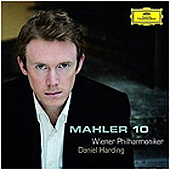
ESSENTIAL RECORDINGS

This performance of Mahler’s Tenth joins thirteen other versions which are readily accessible in the current record catalogue. Such profligate production attests to the level of acceptance and popularity that the symphony has achieved since the pioneering Ormandy account of 1965 (Sony). It fascinates as the last guttering candle of Romanticism but there are still reservations about the proto-legitimacy of any and all of the completions or performing versions. Henry-Louis de la Grange is the leading authority on the composer. In the fourth volume of his exhaustive biography, Gustav Mahler: A New Life Cut Short (1907-1911) (Oxford 2008), de la Grange devotes 77 pages to an analysis of The Unfinished Tenth Symphony and has this to say: “Hence the music of the Tenth Symphony cannot be discussed in the same definitive terms as can be applied to his completed works. It contains much great music and will always remain a thrilling document concerning the direction Mahler’s creativity w as taking him at the age of 50. However, since the last movements so closely reflect what was perhaps the most excruciating emotional crisis ever to confront him, one can only wonder, in finis, whether he would have actually permitted this work—or at least its finale—to remain in such an openly autobiographical state.” An acute observation of paradox: step back from the tragedy of never being able to hear the symphony as Mahler would have intended. Rather, digest the corollary that we might never have heard it at all if he had not died in 1911… And reflect that since the score cannot exist in a definitive state, neither can an absolutely definitive performance ever be achieved. If the objective listener can conclude that any account has presented a magnificently moving and powerful early 20th century symphony without regard to its provenance, then the performance succeeds. In accordance with this basic criterion, Harding and the VPO are successful here.
In his first concert appearance on the Philharmonic podium (at the age of 28), Daniel Harding gave the Viennese premiere of the work in 2004 to great acclaim. For his first DG recording, he offers an original and perceptive interpretation. Like most of the (mostly distinguished) conductors who have attempted this feat, he personalizes certain details. With due respect to Edward Seckerson’s otherwise excellent booklet note, Harding omits the concluding bass drum stroke of the fourth movement. In thematic development and artfully rounded transitions, Harding often seems to be skirmishing toward a line in the sand marked: Achtung! NeoKlassik! He always manages to keep out of the maudlin minefield while still producing the most refined recording of this work ever committed to disc.
It is a great pleasure to hear the VPO in top form. Harding exploits those dark-hued Vienna double basses and the special sonority of their horns. The orchestra is definitely on his side (and this must never be taken for granted in Vienna) which is a promising indication for future collaboration. It will be interesting to discover his further repertory options for recordings considering that the even younger Gustavo Dudamel is also signed up to the yellow label.
Stephen Habington